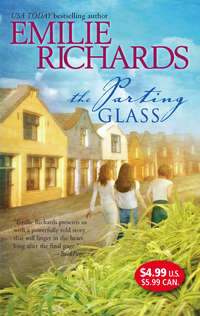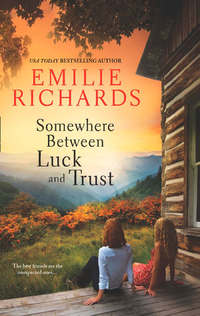
Полная версия
One Mountain Away
“Not everybody would get it.”
Charlotte patted her hand. “I was close to tears, so I started listening to them to keep my mind off my future. One of the women was in her thirties, and I realized she was complaining about how she needed a live-in babysitter for the summer, but nobody wanted a low-paying job like that. Her friend laughed and said that maybe the problem was they didn’t know what to do with two active boys. It would take somebody young and energetic. And stupid, the other woman said, and they both laughed.”
“Nothing like a hard sell, huh?” Harmony said.
“So I stood up and leaned over. And I said, ‘I’m not stupid, but I am looking for a job for the summer and a place to live.’ They looked me over like I’d just crawled out of a tunnel. I knew I had thirty seconds to sell myself. So I told them I had references, that I was from the mountains but I had a high school diploma and, more important, that I really needed the job and the place to stay because my grandmother had just died. I said if that mother hired me, she could be sure I wasn’t going to up and leave—that’s how I said it—because I really didn’t have any other place to go, no matter how much trouble her little boys were, and besides, I had helped my gran teach Sunday School for years, so I knew kids.”
“It’s like somebody put that woman in your path.”
Charlotte considered that. Maybe at the time it had felt that way, but in the years afterward she’d convinced herself that people made their own luck—probably so she could be even prouder of herself for what she had achieved.
“That’s the definition of faith, isn’t it? I honestly don’t know whether I believe that, Harmony, but I do believe this. If life hands you an opportunity, you grab it and hold on to it the way you hold on to a child who’s squirming to be set free. That’s what I did. Mrs. King was never sorry, not for one moment, that she grabbed her own opportunity and hired me. I stayed with the family a couple of years, and by the time they moved away, I wasn’t afraid anymore. I knew I could make it, and I did.”
“Lottie Lou?”
Charlotte felt herself smiling. “My mother’s idea, and I’ll tell you a secret. It’s not even a nickname. It’s the name that was right there on my birth certificate. I changed it legally the moment I had the money to do it, but Charlotte Louise Hale is a fraud.”
“Never a fraud. You’re a kind woman. And all this, this part of your past? That’s why you’re offering me a place to stay?”
Charlotte thought of all the reasons why she had offered, so many more than she could tell the young woman. She had already made herself uncharacteristically vulnerable, and that was enough for one day.
“That’s the reason,” she said. “Because I know what it’s like to need a safe place to get back on your feet. I was homeless. I know what it feels like to worry about where you’ll sleep and whether you’ll be safe. I wanted you to know that I really do understand.”
“Wow.” Harmony’s eyes filled with tears. “But that woman at the restaurant gave you a job, Charlotte.”
“Harmony, you have a job. You don’t need another one.”
“No, you worked for what you got. I’d just be living here and taking up space.” She brightened. “I could cook for you. And clean.”
Charlotte saw that earning her way made all the difference to Harmony. “I have a housekeeper who comes in part-time to clean, but she doesn’t cook. Do you like to cook?”
“I love to when my stomach cooperates. But I’m a vegetarian. I don’t cook meat. And I’ll have to fix things early in the day if I’m working the dinner shift. Would that be okay?”
“Better than okay. I have a small appetite, so I won’t need anything fancy. And I’ll pay for all the groceries.”
“May I do the shopping? You can tell me what you like, and I’ll make sure we have it in the house.”
Charlotte reached over and held out her hand, palm up. “That would be such a big help.”
Harmony slapped the outstretched hand with her own. “You’ve turned things around to make me feel better about this. We both know you’re helping me.”
“Trust me when I say it’s mutual, okay?”
“What could you need that you don’t have already?”
Charlotte tried to smile. What did she need? A thousand “first days” to fix all the mistakes she had made? Her daughter and granddaughter safe in her arms? A chance to tell Ethan she was sorry she had so easily discounted the life they had shared?
“I’ll get back to you on that,” she said. “For now? A friend and a cook.”
“May I look around the kitchen? You know, to see what’s here?”
“I’m officially turning it over to you.”
Harmony looked as if Charlotte had just given her a present. “You won’t be sorry.”
Charlotte wasn’t sure about much in her life, but she was sure she wouldn’t be sorry she had made this offer. No matter how it turned out, what did she have to lose?
Chapter Nine
IF ANALIESE HAD one complaint about the Church of the Covenant, it was the migraine-producing administrative tasks that fell to her. The meetings, the committees, the pledge campaigns, even her association with Covenant Academy, the private school affiliated with the church. On the day that she had heard the call to ministry she had envisioned a different life, filled with prayer and the spiritual needs of her flock. Instead, too often she combed through budgets, fiddled with mission statements, coordinated volunteers and staff alike. Even their competent church administrator couldn’t save her from the worst of it.
During her first week she had realized she would burn out quickly if she allowed her days to be swallowed by paperwork. So she’d made rules. Except for emergencies, Thursdays were devoted to the Sunday service, the sermon and liturgy, and whatever research they required. Fridays were devoted to pastoral calls and counseling.
Usually Fridays were her favorite day of the week, but today she awakened with a vague feeling of dread.
She made two hospital visits before stopping for sandwiches downtown with the new chairman of the finance committee. The young CPA had recently gotten a divorce, and instead of budgets and endowments, they talked about how well he was coping. Well enough, she decided, when he admitted his biggest concern had been who would get custody of their collie. Analiese hoped he would wait a few years before he tried married life a second time, but she was glad he’d ended up with the dog, if not the wife.
After he left to go back to work, the afternoon stretched in front of her. She had two counseling appointments in the early evening and plenty to do at church. But she had one more person to see before she went back to the relative peace of her office.
A vision of Charlotte Hale sitting in the chapel had nagged at her since yesterday. It had bothered her all through Minnie Marlborough’s funeral and later that night at the monthly council meeting. When she got out of bed this morning, she had realized she had to see Charlotte again.
She didn’t want to call her at Falconview or meet her there. She had been to the Falconview headquarters once on church business. There was nothing wrong with the modern office building on Hendersonville Road, with its sleek surfaces and smoky glass windows, except that words seemed to echo and disappear in Charlotte’s office. At the time she had wondered if that was intentional. After all, Charlotte was not particularly fond of listening to anyone else.
Now she pulled out her cell phone and called Charlotte at home to leave a message. She planned to ask if she could drop by that evening. Instead, she got Charlotte on the first ring. She was so surprised it took her seconds to form a different plan.
“I’m sorry,” she said. “I thought I’d be leaving a message. I was calling to see if I could stop by for a visit this evening, but if you’re home now and up for it…?”
Charlotte sounded weary, but she told Analiese to come ahead.
Half an hour later she pulled up in front of Charlotte’s house. Sitting in her car and reluctant to go inside, she looked over the serene landscape. She’d been here several times, and it never ceased to amaze her that one woman lived alone in a house that was large enough for three generations.
Several years ago Charlotte had volunteered this house for a mission fundraiser, and a hundred people had fit so easily inside and around the light-bedecked swimming pool that Analiese had been sorry the committee hadn’t tried to accommodate twice as many.
The fundraiser had gone off without a hitch, organized down to the final slice of cheesecake by Charlotte herself. It had all been so perfect, but no one had lingered, or talked too loudly, or eaten more than his share. No one had taken off pumps or wingtips, rolled up hems and dangled feet in the twinkling turquoise pool. By ten the caterers had disappeared, and Analiese and the others had gone home, oddly sober despite an abundance of fine wine and a bartender with unlimited abilities.
She wasn’t sure what she was going to say. I’m sorry I snapped at you when you were trying to make amends? I can’t shake the feeling you might need to talk and I might need to listen? I’m worried about you even though you’re a woman who discourages such a thing?
Without a firm plan she got out of the car and walked to the front door. Sometimes it was just best to see what was needed. Anyway, it was entirely possible that Charlotte would politely and firmly boot her back out the door before she had a chance to probe.
She rang the bell and listened to the electronic Westminster chimes resonate through the foyer and up the curving staircase. Charlotte took her time, but she answered the door herself. She opened it and stood back to let Analiese inside. She wasn’t smiling, but she didn’t look as if she regretted the intrusion.
“I have iced tea,” she said. “And juice. Why don’t we get something to drink and sit out by the pool? It’s turned into a beautiful day, hasn’t it?”
Analiese agreed but asked for iced water instead. In a few minutes they were sitting on a flagstone patio with the kidney-shaped pool sparkling just beyond them.
“Is this how you get your exercise?” Analiese asked. “With the weather getting warmer, swimming must be something to look forward to.”
Charlotte played with her glass of tea, rubbing the accumulating moisture with her palms. “I hate to say this, but I almost never use it. I used to swim every single day when I moved in, but over the years…?” She shrugged.
Swimming was a communal activity for Analiese. She couldn’t remember ever being in a pool alone, and she wondered if that bothered Charlotte, too.
“How did the memorial service go?” Charlotte asked, before Analiese could think of a way to say what she needed to.
“The best services leave people feeling better because they can start to put the life and death in perspective. I think we began that yesterday. The stories about Minnie went on almost an hour. There was a lot of laughter. That’s always good.”
“I never met her.”
“I didn’t think you had.”
“When Falconview realized we had to have her property, I sent other people out to talk to her. They brought back reports. They did all the legwork. I only saw the house once, just before it was torn down. I never saw…” She shook her head, staring at the pool. “Do you ever look back at your life and wonder how you could have been so wrong when you were so sure at the time you were right?”
Analiese didn’t know what to say. She had known Charlotte Hale for nearly a decade, but this was not the same woman.
She realized something personal was called for. “You know I used to be in television news? I can’t tell you the number of times I pushed people to reveal something on the air that I knew would come back to haunt them. I told myself the public had a right to know the truth. That’s what we always told ourselves, but when I look back on it now? It doesn’t seem to help.”
“You’re being kind.”
“I’m being truthful.”
“I have so many regrets.”
Analiese felt as if she’d stepped into another dimension.
Charlotte turned to look at her and saw her confusion. “And now you’re wondering if Charlotte Hale’s been the victim of body snatchers.”
“No, I’m thinking that I’m glad I’m sitting here with you. Being here today won’t be one of the things I regret.”
Charlotte sighed. “I’m dying.”
For a moment Analiese wasn’t sure she’d heard her right. She leaned forward and rested her fingertips on Charlotte’s arms. “What do you mean?”
“Maybe I’m being dramatic. I have leukemia, an acute form, which means the news is very rarely good. I got sick a couple of months ago—in fact, I nearly died. The doctors say it’s still theoretically possible I won’t die at all. Not from leukemia, anyway. But even the most optimistic say it would have improved my chances to make an earlier diagnosis. I let myself get right to the point of no return because I was too busy to pay attention to the way I felt. Too busy changing the Buncombe County landscape. Too busy making money and trying to get the world to see things my way.” She smiled a little. “Too busy to wonder why I never recovered from what I thought was a drawn-out winter cold.”
“I am so sorry.”
“You and me both.”
“But you could beat it?”
“I did a serious round of chemo at Duke and I’m in remission, waiting for my strength to improve and my counts to go up high enough to start the next phase. But while the bone marrow looks good, the counts don’t, so my doctors are being cautious.”
“How did you pull this off without people knowing?”
“I told anyone who mattered that I was in Europe with a group of investors, then off to Saint Martin on a well-deserved vacation. Trust me, chemo was no vacation.” She touched the top of her head. “I didn’t lose too much of my hair, so that was a bonus, and I could afford a good haircut and products galore to make it look thicker. I’m trying to gain back some weight.”
“Why didn’t you tell me then? Was there somebody…?”
“To help? No, you’re the first person I’ve told, and maybe the only one for a while. The last thing I want is anybody to feel sorry for me. I don’t want anybody trying to be nice because they don’t want to feel guilty when I die.”
Analiese already felt this secret weighing her down. All the things she knew that might help wouldn’t, not unless Charlotte was willing to let people know she needed their support.
“Why are you telling me?” she asked at last.
Charlotte laughed a little, and to Analiese the sound seemed real, not a bit forced. “You mean you don’t think I need you to absolve me of all my sins?”
Analiese smiled in response. “I would, if that were in my power.”
“I know. You take your job very seriously.”
“I’m afraid it’s a serious job.”
“Especially at moments like this one.”
“Not my favorite part.”
“Do you feel burdened?”
“Who’s helping whom?”
Charlotte was quiet for a moment, as if she needed to put her words in order. “You know, if you were some kindly older man, with thirty years of ministry behind you and a beatific smile—”
“This would be easier,” Analiese finished for her.
“That’s actually not what I was going to say. No, I was going to say this would be impossible.”
“Really?”
“Here’s the truth, and I’ve given it a lot of thought. No matter our differences, I know I can trust you. And I know you’re going to give helping me your best shot. You’re going to be sensible and thorough, and you’re going to dig deeper than somebody who thinks he has all the answers at his fingertips because he’s too tired to look for more.”
“That may be the nicest thing anyone’s ever said about my ministry.”
“And now you’re waiting for the punch line.”
“Something like that.”
Charlotte set her glass on the table and wiped her hands against her beige capris. “I should die more often. It makes for great repartee.”
“I’d rather you didn’t.”
“I think you mean that.”
“I think so, too.”
Charlotte was silent again, and Analiese sat quietly.
“I said I have a lot of regrets,” Charlotte began at last. “Here’s one of my biggest. When I heard the diagnosis, in the moments right before I zoomed off to Durham? I felt such a rush of relief.” She had been looking out at the pool, but now she turned. “Even though I was terrified, I thought, ‘It will be good to die and get this over with.’”
Analiese realized her concern must have shown, because Charlotte hurried on.
“I would never, never take my own life. You have to understand that. But when I realized living a long full life was probably out of my hands? I just wanted to close my eyes and wait for the end. My grandmother used to tell me death was the last mountain we have to climb, and just before she died, she opened her eyes and looked toward the window in her bedroom as if she were viewing a miracle.”
“That must be a good memory.”
“When the doctor told me my diagnosis? I thought about that day and about the look on her face, and I found myself hoping that she hadn’t really been looking at the gates of heaven, that there really wasn’t anything waiting for any of us except eternal sleep. That’s when I realized what a loss my life has been.”
When she didn’t know what to say, Analiese knew not to say a thing. She was almost certain this was not the moment for reassurance, although it felt wrong not to give it.
“I have to change things,” Charlotte said at last. “I realize whatever time I’ve been given, whether it’s months or years, I can’t die knowing I’ve made so many mistakes and never tried hard enough to set them right. I realize dying’s not about what comes next, because no matter how great or poor our faith, we really can’t know what’s waiting, or at least I can’t. For me it’s about what came before. The impact we had. The love we gave. The hearts we left intact…” She cleared her throat, and her eyes filled with tears. “Or broken.”
“I hope you aren’t saying that you’ve done nothing important with your life until now. Because you’ve given generously in many ways.”
“Too often for the wrong reasons.” Charlotte held up her hand to stop Analiese from continuing. “I realize nothing’s that cut and dried. I’ve done things because I knew they were important and right, and sometimes they were. But I’ve done so many things that seemed right and were terribly, terribly wrong. Like moving poor Minnie off her land. And here’s how I know. When I found out I was dying, I realized there wasn’t one person in the world who would really care. That I’ve lived fifty-two years, and while some people will feel conflicted, or even a little bit sad, no one will really miss me. Not because people are cruel, but because I haven’t given them a reason to.”
Analiese would have given almost anything to be able to contradict her, but not only wasn’t that the right approach, she was afraid what Charlotte had just said was true.
Who would miss Charlotte at the Church of the Covenant? The council and committee members whose opinions she had too often ignored or overlooked? The staff who winced whenever she approached with a new list of jobs or, worse, helpful advice on how to do their present ones?
And what about the rest of Charlotte’s contacts? She was said to have an iron grip at Falconview, with an annual exodus of staff who fell out of favor or disagreed with her one time too many. She’d served on boards all over town, but despite the advantages she brought of insight, financial support and prestige, she routinely tried the patience of administrators and board members alike.
Then, of course, there was her family, who were never mentioned, despite the fact that they lived right here in Asheville.
“Why haven’t you?” Analiese asked. “Why haven’t you allowed anybody to get close?”
“That would take longer to tell than we have now.”
“But it sounds like you understand, at least a little?”
“I had nothing but time when I was hooked up to those IVs at Duke. Everybody should be shut up alone in a room for weeks, with nothing to do but reconsider their lives.”
“And it wouldn’t hurt to have an actual death sentence to urge them on.”
“It’s quite the motivator.”
Analiese felt for the right words. “I admire you. I admire this—this desire to set things right, to reevaluate, even though your life could be nearing its end. But, Charlotte, are you trying to make a bargain with God?”
“No, I think God’s better than that.”
“This is a lot to admit to, especially to someone you’ve butted heads with in the past.”
“That’s what makes you perfect, Analiese. Because if you ever had anything to lose by being honest with me, you’ve lost it already. So I think I can count on you to continue being honest, to pull me up short if I go off half-cocked, to help me live out whatever time is left in a way that won’t come back to haunt me on my deathbed. That’s what frightens me most. That one day in the not so distant future I’ll have only moments to look back on my life and nothing I’ll see will give me comfort.”
Charlotte leaned closer. “I know I’m asking a lot, more than I should. You’ve probably already guessed one thing I want to try to set right before I die.”
“Minnie? You tried to give me money for the animal shelter….”
“When I got home that night I wrote a check in her honor and sent it off, anyway. But you were right, that’s not what she would have done. It’s a worthy cause, and I’m glad I did it, but she would have acted in a way that mattered personally, reached out without thinking about the consequences. So I’ll be looking for more ways to do that myself. To honor her.”
Analiese took Charlotte’s hands. It felt natural, although before today she could not have imagined touching Charlotte Hale spontaneously and with affection. “Do you want me to look for ways to help?”
“I don’t think so. Not yet, anyway. I think I’ll know the right things when I see them. I just wanted someone to know what I’m feeling. And I guess I just needed to say this out loud.”
Analiese nodded, but she gripped Charlotte’s hands a little tighter and felt them soften in hers. “What else can I do?”
“Will you let me tell you about my daughter?”
Chapter Ten
First Day Journal: April 30
Each day at the park is like a human lifetime. Early in the morning everything sparkles with promise. Dew glistens on blades of grass; the sidewalks are empty pages sneakered feet have yet to write on. The air is still, as if a puff of breath from an angel’s lips is needed to set the day in motion.
As morning progresses, the park begins to waken. Birds sing on branches, and young lovers walk hand in hand. On benches like mine, coffee’s consumed, newspapers unfolded, cell phones pulled from pockets for casual conversations. Two mothers push strollers and chat. The sun peeks through the leafy canopy.
By afternoon balls whiz through the air and children shout commands. On the playground, mothers keep careful eyes on preschoolers who beg to swing higher. The climbing dome becomes a spaceship, the monkey bars an obstacle course over teeming pools of barracuda. The sun beats down on baseball caps and the open pages of books.
When evening comes, stragglers take their time departing, as if sorry to move on to other things. Some scoop up trash and toss it in bins. Others scuff feet in newly planted grass, as if making sure to leave their mark. Darkness is kept at bay by strategically placed lights.
In this way only is a day at the park different from a lifetime. No one and nothing can keep our darkness at bay, no matter how hard we try. I learned this in the hospital from a woman named Gwen, a powerful and uninvited lesson that haunts every step I take.
It’s morning now, and I’ve been waiting an hour. Maddie isn’t here, although she often comes to the park on Saturdays. I wonder how many friends she has. Are other children frightened of her seizures? Do they shun her to avoid the possibility of witnessing one?







